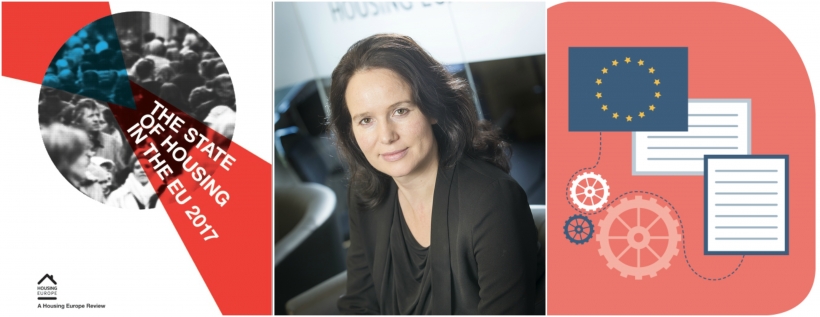5 reasons we need to talk about Housing & the EU
Making the link between the EU policy and the housing sector
Brussels, 19 October 2017 | The future of the EU & Housing
On the occasion of the launch of 'The State of Housing in the EU 2017' report, Housing Europe Secretary General, Sorcha Edwards explains which are the five concrete links between EU policy and the housing sector, beyond the statement that "housing is not an EU competence".
1. The best non-for-profit housing systems are supported by long-term stable financing. Spending limits and deficit rules on Member States are set at EU level via the Growth and Stability Pact. VAT levels in housing are set within a framework agreed at EU level. EUROSTAT, An EU statistics office also classifies spending as public or private based on how it is funded and governed. The EU also has a say in the negotiation of new international banking rules. These limits and classifications have a real impact on investment in social and affordable housing around Europe.
2. Markets increasingly also fail to provide affordable housing to households that would not directly be labelled as ‘disadvantaged citizens or socially disadvantaged groups’ (including middle incomes, large families, young families and households that are incentivised and allowed to remain to prevent segregated communities). Market rules within the EU, are defined at EU level. Since 2005, the European Commission requires limiting social housing as a Service of General Economic Interest to ‘disadvantaged citizens or socially disadvantaged groups.’ In additional, as housing markets were at the epicentre of the Great Financial Crisis, they are now subject to recommendations (albeit non-binding) agreed at EU level.
3. Inadequate use of energy in housing results in an environmental and social problem. Heating and cooling of homes produce Greenhouse gases alongside bills which increasing numbers have difficulty paying. The implementation of the Paris climate agreement and Globally agreed Sustainable Development Goals within Europe are coordinated at EU level. In addition, EU directives impact Member States regulatory framework & financing of energy efficiency in housing, the governance of the energy grid which impacts development of renewable energy and strategies to measure and tackle fuel poverty.
4. Migration of people across the internal and external borders of the EU has reached the highest levels since the foundation of the Union. Global warming, war and poverty will mean that this is set to continue and implies that in many cases stays will not be temporary. Successful integration will be key to the success of the EU and requires access to rights and services with adequate housing being a pre-requisite. Those who are opposed to immigration are also Euro sceptic. A clear support framework for those contributing to the integration process is vital.
5. Housing policies need to be determined locally however when it comes to the EU, Coherent unambiguous support is required for those working on this basic building block for sustainable societies. The right to housing has been included in the proposed EU Social Pillar. As part of the EU Urban agenda a Housing partnership, including Housing Europe, has been established to prepare a roadmap for better regulation, financing & knowledge on housing. European banks are increasing loans in the non-speculative housing sector, while eligibility for structural funds in our sector is widening in scope. These are steps in the right direction and may help to improve coherence, however the statistics presented in this publication reveal that social housing systems are increasingly being weakened. There is now no time no room for confusing or contradictory signals coming from EU level which may reinforce this trend. The stakes are too high.
Leave comments